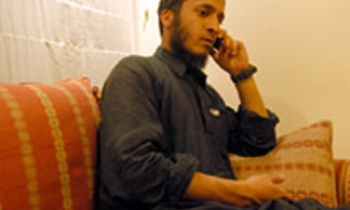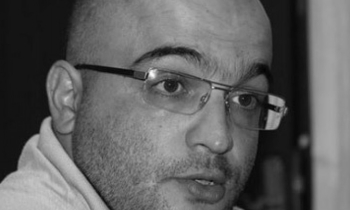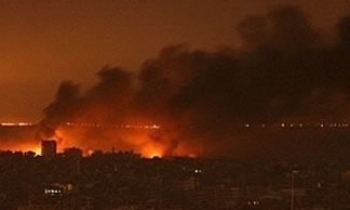Journalists in Yemen rallied in protest after police arrested a Yemeni opposition editor accused of backing the country's Shiite rebels. Dozens of journalists gathered in front of the general prosecutor office in the Yemeni capital, San'a, demanding the release of the Al-Shura weekly's editor Abdel Abdul Karim al-Khawinay, taken by police to jail earlier in the day.

At around noon on Wednesday, Yemeni security agents raided the home of al-Khaiwani, editor of the online newspaper Al-Shoura, which is affiliated to the Popular Forces Union Party, several Yemeni journalists and local news reports said. Al-Khaiwani was brought before a state security prosecutor charged with handling terrorism cases.
He is under investigation for allegedly having ties to a terrorist cell associated with rebels fighting government forces in the northwestern city of Saada, journalists and news reports said. The prosecutor ordered al-Khaiwani held for the next seven days, those sources said.
The family of al-Khaiwani told the Associated Press (AP) that security personnel stormed their home, beat up al-Khawinay with fists and gun-butts, then dragged him bleeding from the ear and nose to the police station. "His face, pajamas were all stained with blood," said al-Khawinay's wife, who gave her name as Um Mohammed.
“We are troubled by the detention of Abdelkarim al-Khaiwani, and call on officials to publicly disclose the evidence used to hold him,” said Committee to Protect Journalists (CPJ) Executive Director Joel Simon. “While the accusations are serious, we remain concerned that al-Khawiani is being punished for his outspokenness.”

According to Yemeni press reports, al-Khaiwani is being investigated for alleged ties to 16 men and two women recently arrested for belonging to a terrorist cell in Sana’a said to be affiliated with rebel leader Abdel Malik al-Hawthi. Over the last three years, Al-Hawthi, his family members, and their followers have battled Yemeni government forces in Saada. Fighting was heavy until a ceasefire was reached in recent days.
Al-Khaiwani has been a harsh critic of Yemeni President Ali Abdullah Saleh and, in particular, his government’s fight against the rebels.
In 2004, as editor of what was then a print weekly, al-Khaiwani was sentenced to a year in jail for incitement, insulting the president, publishing false news, and causing tribal and sectarian discrimination. Articles had criticised the government's conduct in the fighting and had accused it of fostering terrorism with its actions.
Acording to AP, the arrest followed a ceasefire between Yemeni government troops and followers of Shiite rebel leader Abdel-Malek al-Hawthi which came into effect this week. The ceasefire ended three years of fighting that claimed thousands of lives from both sides, as well as forcing thousands from their villages in the northern Saada province.

Mediators overseeing the cease-fire, including Qatari diplomats, said that it was holding, despite the killing of some 10 army soldiers after their vehicles came under rebel attack late Tuesday, the AP report said.
The deal, reached under mediation from Qatar, requires rebels to hand over their heavy weaponry to the government in return for the government releasing rebel prisoners, paying for the reconstruction of villages ravaged by the fighting and helping displaced people return home.
The Shiite Muslim uprising began in Yemen's north in June 2004, when cleric Hussein Badr Eddin al-Hawthi ordered his followers to take up arms against the government. Al-Hawthi was killed in clashes later that year. Abdel-Malek al-Hawthi, the current rebel chief, is the brother of the slain leader.









